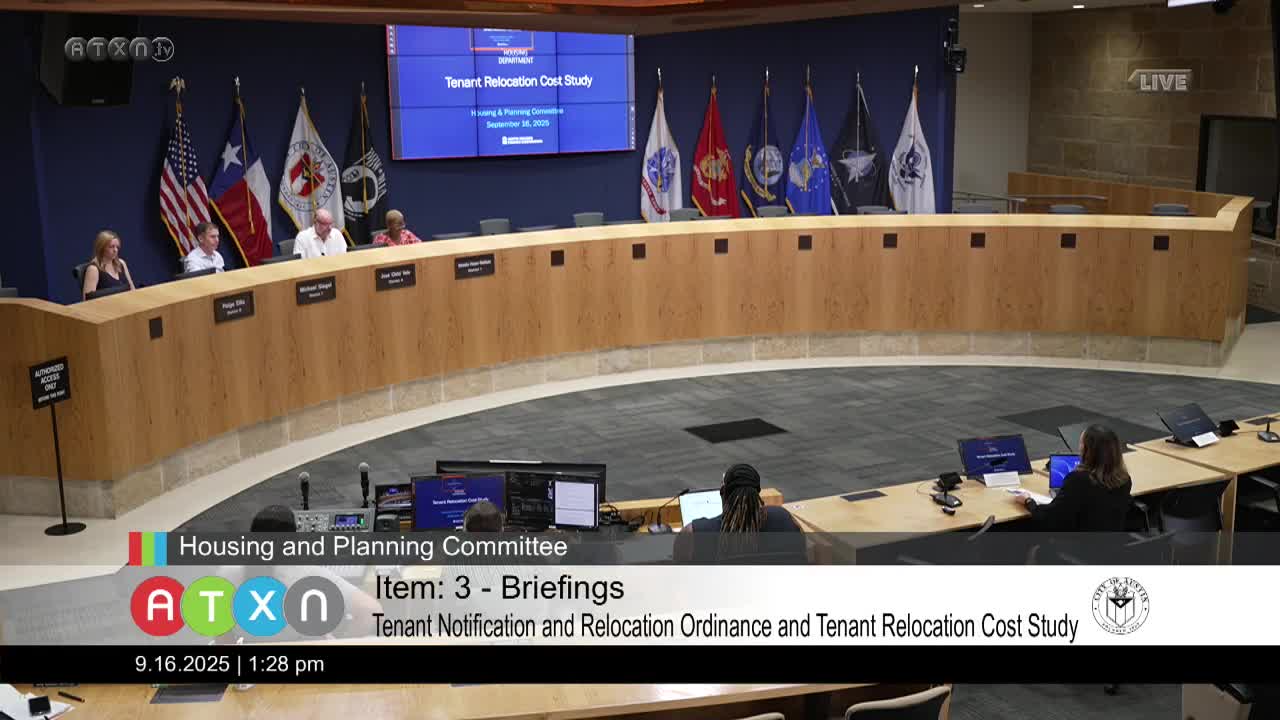Austin Council Discusses Tenant Relocation Ordinance and Cost Study Findings
September 16, 2025 | Austin, Travis County, Texas
This article was created by AI summarizing key points discussed. AI makes mistakes, so for full details and context, please refer to the video of the full meeting. Please report any errors so we can fix them. Report an error »

In a recent meeting of the Austin Housing & Planning Committee, significant discussions centered around the tenant notification and relocation ordinance, a crucial policy aimed at protecting renters during redevelopment activities. The ordinance, originally adopted in 2016, mandates that tenants receive timely notifications when their residences are subject to demolition or major renovations, particularly in multifamily housing and mobile home sites.
Suzanne Watkins, the division manager of the Austin Housing Department, provided an overview of the ordinance and its evolution, highlighting the importance of interdepartmental collaboration to ensure compliance with notification requirements. The ordinance was reinforced through a 2022 update, which aimed to streamline the notification process and enhance tenant protections.
A key focus of the meeting was the completion of a tenant relocation cost study conducted by Eco Northwest, a consulting firm. This study was commissioned to better understand the financial implications of tenant displacement due to redevelopment. Watkins noted that while the city can no longer implement a developer-funded program due to state legislation, it has shifted to a city-funded model to support affected tenants.
The study aims to gather insights into the current rental market in Austin, particularly how displaced tenants navigate their housing options after eviction. It also seeks to inform future planning for the tenant relocation program, ensuring it meets the needs of those most affected by redevelopment.
The committee discussed the eligibility criteria for the city-funded relocation program, which varies for multifamily and mobile home residents, and includes services such as housing locator assistance, moving and storage support, and rental payment assistance. These services are designed to alleviate the financial burden on tenants facing displacement.
As the meeting progressed, Eco Northwest representatives presented their findings, emphasizing the need for a comprehensive understanding of relocation costs and the challenges faced by displaced families. The insights gathered from this study will be instrumental in shaping the future of the tenant relocation program and ensuring that it effectively supports Austin's vulnerable populations.
In conclusion, the discussions at the Austin Housing & Planning Committee meeting underscored the city's commitment to enhancing tenant protections amid ongoing redevelopment pressures. As the city moves forward, the findings from the tenant relocation cost study will play a pivotal role in refining policies and ensuring that displaced tenants receive the necessary support during transitions.
Suzanne Watkins, the division manager of the Austin Housing Department, provided an overview of the ordinance and its evolution, highlighting the importance of interdepartmental collaboration to ensure compliance with notification requirements. The ordinance was reinforced through a 2022 update, which aimed to streamline the notification process and enhance tenant protections.
A key focus of the meeting was the completion of a tenant relocation cost study conducted by Eco Northwest, a consulting firm. This study was commissioned to better understand the financial implications of tenant displacement due to redevelopment. Watkins noted that while the city can no longer implement a developer-funded program due to state legislation, it has shifted to a city-funded model to support affected tenants.
The study aims to gather insights into the current rental market in Austin, particularly how displaced tenants navigate their housing options after eviction. It also seeks to inform future planning for the tenant relocation program, ensuring it meets the needs of those most affected by redevelopment.
The committee discussed the eligibility criteria for the city-funded relocation program, which varies for multifamily and mobile home residents, and includes services such as housing locator assistance, moving and storage support, and rental payment assistance. These services are designed to alleviate the financial burden on tenants facing displacement.
As the meeting progressed, Eco Northwest representatives presented their findings, emphasizing the need for a comprehensive understanding of relocation costs and the challenges faced by displaced families. The insights gathered from this study will be instrumental in shaping the future of the tenant relocation program and ensuring that it effectively supports Austin's vulnerable populations.
In conclusion, the discussions at the Austin Housing & Planning Committee meeting underscored the city's commitment to enhancing tenant protections amid ongoing redevelopment pressures. As the city moves forward, the findings from the tenant relocation cost study will play a pivotal role in refining policies and ensuring that displaced tenants receive the necessary support during transitions.
View full meeting
This article is based on a recent meeting—watch the full video and explore the complete transcript for deeper insights into the discussion.
View full meeting
